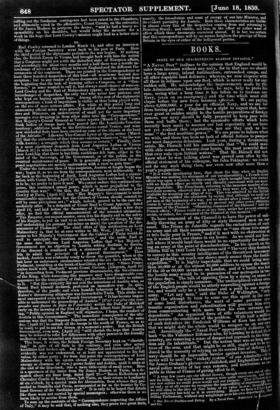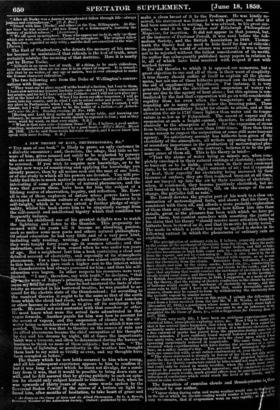"A NAVAL Peer" inclines to the opinion that England would
be safer from invasion without any nave, for in that case we should have a large army, inland fortifications, entrenched camps, and all other requisite land defences ; whereas, we now dispense with all these in reliance upon our fleet, which is never ready for any sudden call. He acknowledges the improvements made by the late Administration; but even these, lie says, help to prove his ease, seeing what a long time it has taken us to increase our Navy, (even on an emergency,) and the time which must still elapse before the new force becomes ejicicut. We are paying above 8,000,0001. a year for an efficient Navy, and we are far from having got one. England has a right to expect that, how- ever great or sudden might be the hostile preparations of foreign powers, our navy should be fully prepared to keep pace with them and baffle them ; but the spasmodic efforts which have recently been made to recover our lost superiority at sea have not yet realized this expectation, nor are they such as be- come " the first maritime power." We are prone to believe what we wish, and there has been no lack of official fictions to pamper our most dangerous delusions. Last year, during a threatening crisis, Mr. Disraeli told his constituents that " We could man with able seamen, in twenty-four hours, the most powerful fleet that ever rode upon British waters." That Mr. Disraeli did not know what lie was talking about was proved soon after by the official statement of his colleague, Sir John Pakington: we could not do any such thing then, nor even now after more than a year's preparation. " It is worth mentioning here, that about the time when an English Minister was making his statement of our invulnerability, a French naval officer was upon a mission to this country, which brought him into contact with an English officer peculiarly and officially conversant with our milli- time population. The I renchman, referring to the immense number dour merchant seamen, observed that in practice they were not, as in France, available for manning our ships of war. This was admitted by the British officer, who qualified the admission by saying that although we could not get men at the beginning of a war, yet we should after a time ; and that of course it would always be our policy to prevent any other power obtaining command of the Channel. 'Obtaining command of the Channel !' said the French officer, France could do so at any time, under her present arrange- ments, or rather, has command of the. Channel at this moment: " To have command of the Channel is to have the power of sud- denly throwing an army of fifty or sixty thousand men on our coast. The Prince de Joinville regards the embarkation of such an army and all their accompaniments as " wie chose trds simple et tres facile pour la France,' and if it met with no obstruction at sea it would reach our shores in six hours. As we could not fore- tell where it-would land. there would be no opportunity for collect- ing an i army at the point of disembarkation. In his speech on the Militia Bill in 1852 Lord Palmerston said " The very ship destined to convey to this country intelligence of the threatened armament would probably not reach our shores much sooner than the hostile expedition." It is highly improbable that we could bring more than 30,000 or at the utmost 40,000 soldiers to oppose the march of the 30 or 60,000 invaders on London, and if a battle was lost the hostile army would be in possession of our metropolis in two or three days. The talk of opposing them by a rising en masse of the population is simply nonsense. The undisciplined valour even of the English people would. be utterly unavailing against a foreign foe, and would only be a hindrance and a peril to our regular army. "Let any man," said the Duke of Wellington, "only make the attempt to turn to some use this spirit in the case of some local disturbance, the want of some previous sys- tematic organization and subordination will prevent him even from communicating with more than his own servants and dependants." An organized force of rifle volunteers would in- deed reverse the conditions of the problem. With half a million of such defenders Sir Frederick Williams of Kars has declared that we might defy the whole world to conquer us on our own soil. Accordingly the "Naval Peer" appropriately dedicates his book "to the Volunteer Riflemen who, by learning to defend duo country, are removing a sense of danger and reproach to the king- dom and its inhabitants." But the nation that was so long mis- tress of the seas, and that might be so still, ought not to be re- duced to the necessity of relying on its second line of defence; navy should be an impassible barrier against invasion. tynu_ist it never will be until the "rickety system" of our Admiral




































 Previous page
Previous page